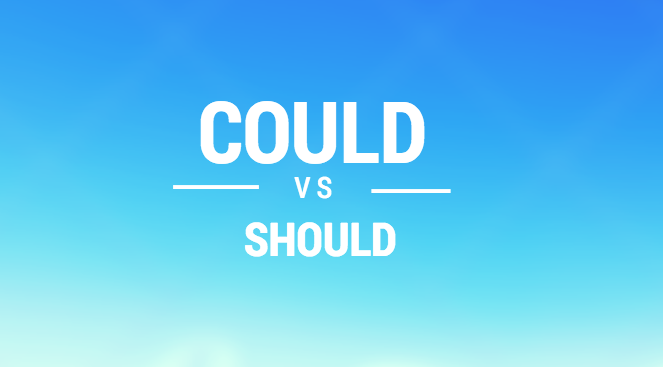This last weekend, I took a fiction-writing class with a local author, Ken Scholes. As we went around the room to introduce ourselves, a common theme emerged.
Most of us thought we should be writing more words, we should be submitting more short fiction, we should be taking more classes, we should be reading more books. “My best time to write is in the morning,” said the woman to my right. “I really should get up two hours before my kids so I can use that time.”
Around the table, we all nodded. We should probably do that, too.
As often happens during classes and conferences, I was scribbling furiously. The list of tricks and tips others use in their writing life was positive and invigorating, but as the list grew so did my sense of anxiety. Where would I find time to do all of this?
After introductions, Ken noted that most of us were lamenting the things we should be doing. “What if instead of looking at what we should be doing, we say these are things we could be doing. I propose that for the rest of the class, we replace ‘should’ with ‘could.’ I’ll try to do it, too, and if you catch me, you should call me out.”
We all laughed, and he caught his mistake. “Right,” he said. “You could call me out.”
Strategies or imperatives?
At our jobs and in our personal lives, most of us are striving to do better. Most of my posts on GovLoop are intended to give people ideas – you should update your LinkedIn profile, you should network with your coworkers, you should volunteer for new projects. I eat up this kind of advice myself, consuming article after article about how to market my business better, how to eat healthier, how to be a better friend – and every time I finish reading one, I’m left feeling a bit more anxious.
But what if, instead of constantly telling ourselves that we should do something, we tell ourselves we could do it? Doing laundry tonight is, after all, a choice. So is going for a run. So is going to that networking event, or reworking your LinkedIn profile.
What if we thought of each of these things as a strategy we could choose, rather than a command that’s been issued – or a bar that we’re failing to hit?
The Empty Container
I subscribe to Zen Habits, which when I’m feeling swamped with life can be sometimes infuriating in its quiet simplicity. But last week, right when I needed it this post showed up in my inbox.
After a discussion of how our lives get so complicated, Leo Babauta says:
“Instead of thinking, ‘How can I get rid of this complicated mess?’ … let’s ask, ‘What if I started with a blank slate?’ What would you do if your life was a blank slate? If it were an empty container, with limited space, what would you put in it?”
Instead of trying to tackle this whole mess of obligations, possibilities, and “shoulds,” what if you could just empty your bucket of life out, then sort through each item, only putting it back in if it fits your criteria?
Starting small
It’s posts like that that makes me want to hurl things at Zen Habits.
Sure, it’s actually quite good advice – but who has the kind of life that they can simply rearrange? I sure don’t. I have clients, family obligations, events that have been on the calendar for months, and deadlines that are rushing toward me like toppling dominoes.
I may not be able to clear my plate all at once with a magic wand, but I can start small.
This week my challenge to myself – and to you – is to take a look at your life. Pick just one “should” that’s been stressing you out, and look at it as a “could.” Maybe it’s a conference you feel like you should attend, or a work responsibility you feel like you should take on, or a project around the house that’s been bugging you. Think of this “command” as a strategy. Is it one that will help you? Is it worth the stress it’s adding to your life? Does it belong in your empty container?
If not, toss it out to make room for something more fulfilling.





I’m not sure I know how to throw out a “should”, but I will give it a try. Thank you for the interesting way of looking at how we spend the “coins of our life”.
Great perspective! “Should” reflects a “has to” attitude (aka guilt if you don’t) where as “could” leaves us thinking with possibilities but not requirements.
Thank you for this article. It’s especially timely around the Holidays when there are plenty of “should dos” and it becomes difficult to keep work-home balance.
The word “could” is more of a “can do” word.
Thank you for the article .
[…] wrote this post originally for GovLoop’s blog on November […]